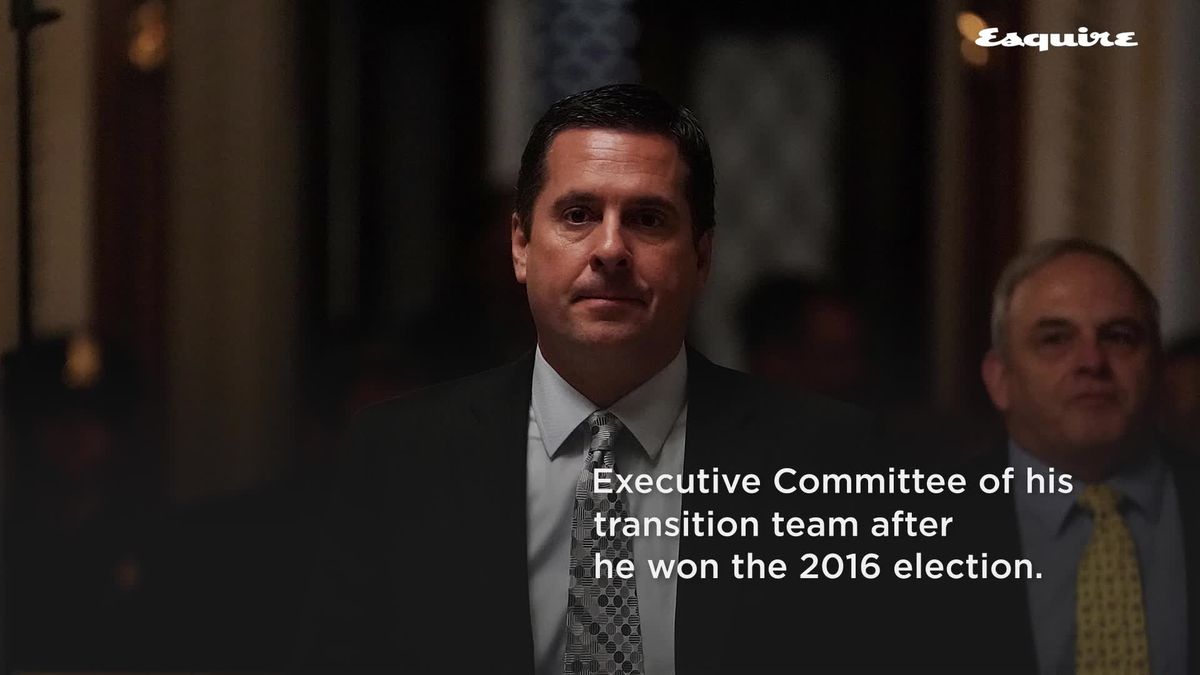Devin Nunes’s Family Farm Is Hiding a Politically Explosive Secret (original) (raw)
Devin Nunes has a secret. Nunes is the California Republican and chairman of the House Intelligence Committee who has become famous in the Trump era for using his position as a battering ram to discredit the Russia investigation and protect Donald Trump at all costs, even if it means shredding his own reputation and the independence of the historically nonpartisan committee in the process.
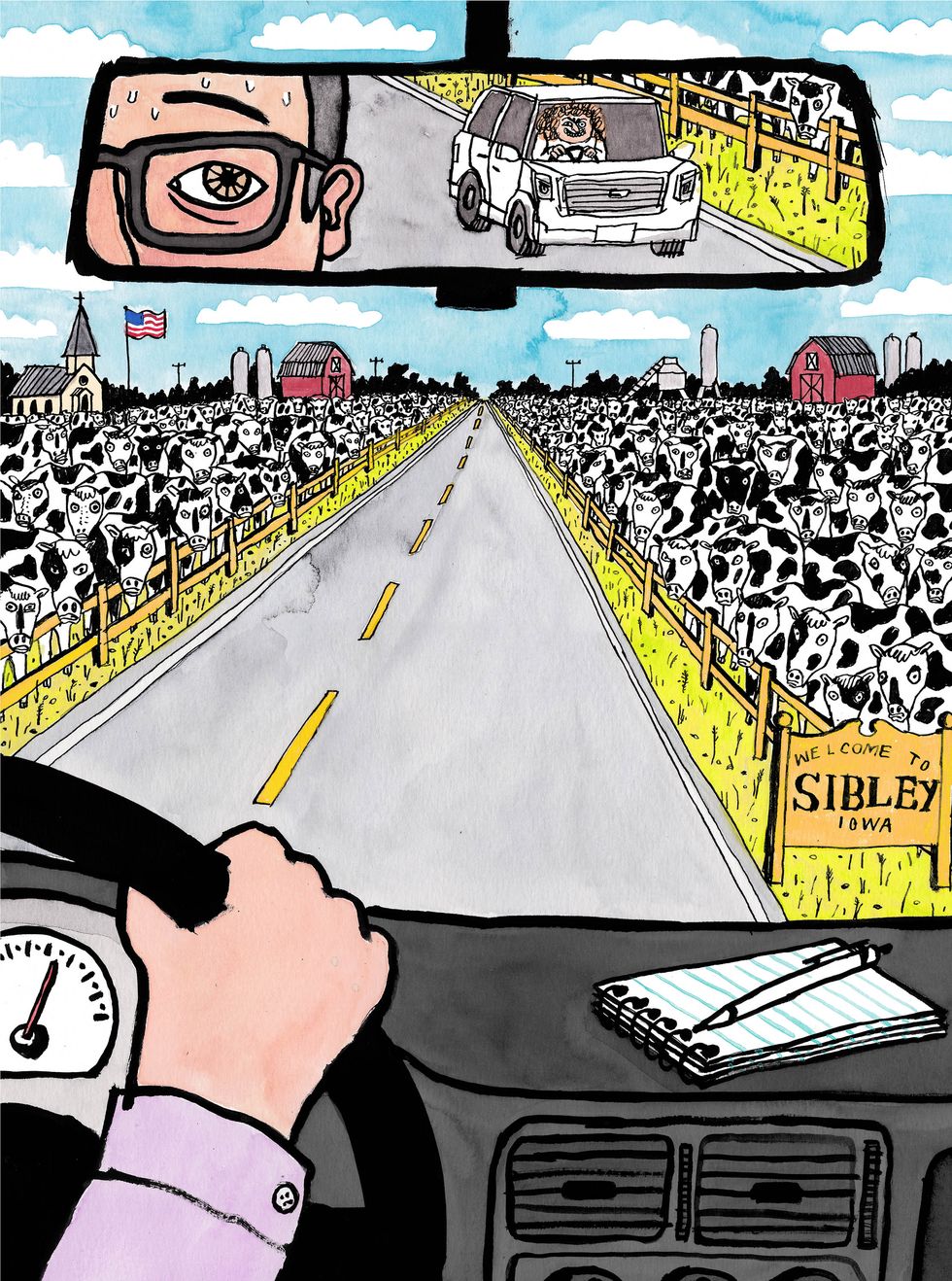
Ed Steed
First elected to Congress in 2002, Nunes wasn’t always like this. At one time he was known for his independent streak. When a new class of radical House Republicans pushed its leadership to shut down the government in 2013, Nunes attacked them as “lemmings with suicide vests.” In 2015, during another tumultuous period of House GOP infighting, I interviewed a broad cross section of the chamber’s Republican leadership, and Nunes stood out for comments he made about how his colleagues and constituents were siloed in right-wing echo chambers and increasingly reliant on this or that “conspiracy theory” rather than “something that is mostly true.” In hindsight, he was prescient about the direction of his party: A few years later, a bona fide conspiracy theorist, one who credited Alex Jones with his victory, was elected president.
Instead of continuing the fight, Nunes served on the president’s transition team and became Trump’s most important defender in Congress. He has used the Intelligence Committee to spin a baroque theory about alleged surveillance of the Trump campaign that began with a made-up Trump tweet about how “Obama had my ‘wires tapped’ in Trump Tower.” Indeed, Nunes has worked closely with the White House to investigate the FBI rather than the FSB (the KGB’s successor), most famously by attempting to undermine the Russia investigation by releasing a partisan report—the so-called “Nunes memo”—that cherry-picked evidence to accuse the FBI of bias in its effort to obtain a warrant to monitor the communications of Carter Page, a Trump foreign-policy advisor.

.
For more bombshell political stories, breaking news, and daily commentary sign up for the Esquire Newsletter.
SUBSCRIBE
Nunes has always been reliably conservative, but on some issues, he has broken with his party. He has long supported moderate immigration reform, for instance, including amnesty for many undocumented people living and working in the U. S. But as Trump has instituted a draconian policy of zero tolerance for all undocumented people and argued that every undocumented individual should be deported, Nunes has been silent. More recently, as Trump and the House Republicans have celebrated Immigration and Customs Enforcement and the agency’s aggressive tactics, Nunes has followed suit. On CaRepublican.com—a Nunes-created news site, which mimics the Drudge Report—he now regularly highlights articles attacking Democrats for being insufficiently supportive of ICE’s raids and deportations.

Getty Images
Devin Nunes (R-CA)
Which brings us back to Nunes’s secret.
Nunes grew up in a family of dairy farmers in Tulare, California, and as long as he has been in politics, his family dairy has been central to his identity and a feature of every major political profile written about him. A March story in National Review is emblematic. It describes how Nunes’s family emigrated from the Azores in Portugal to California’s Central Valley, “a fertile, sunny Eden,” and how the family “worked and saved enough money to buy a 640-acre farm outside Tulare.” The soil of the Central Valley is depicted as almost sacred in these articles. National Review quotes a 1912 Portuguese immigrant farmer who wrote that when he grabs a clump of dirt, “I feel as if I had just shaken hands with all my ancestors.” As recently as July 27, the lead of a Wall Street Journal editorial-page piece about Nunes, which featured a Tulare dateline, emphasized the dairy: “It’s 105 degrees as I stand with Rep. Devin Nunes on his family’s dairy farm.” Last year, Nunes noted in an interview with the _Daily Beast_—headline: “The Dairy Farmer Overseeing U. S. Spies and the Russia Hack Investigation”—“I’m pretty simple. I like agriculture.” The Daily Beast noted, “The cows are not far from his mind. He keeps in regular contact with his brother and father about their dairy farm.”
What is strange is that the family has apparently tried to conceal the move from the public—for more than a decade.
So here’s the secret: The Nunes family dairy of political lore—the one where his brother and parents work—isn’t in California. It’s in Iowa. Devin; his brother, Anthony III; and his parents, Anthony Jr. and Toni Dian, sold their California farmland in 2006. Anthony Jr. and Toni Dian, who has also been the treasurer of every one of Devin’s campaigns since 2001, used their cash from the sale to buy a dairy eighteen hundred miles away in Sibley, a small town in northwest Iowa where they—as well as Anthony III, Devin’s only sibling, and his wife, Lori—have lived since 2007. Devin’s uncle Gerald still owns a dairy back in Tulare, which is presumably where The _Wall Street Journal_’s reporter talked to Devin, and Devin is an investor in a Napa Valley winery, Alpha Omega, but his immediate family’s farm—as well as his family—is long gone.
There’s nothing particularly strange about a congressman’s family moving. But what is strange is that the family has apparently tried to conceal the move from the public—for more than a decade. As far as I could tell, until late August, neither Nunes nor the local California press that covers him had ever publicly mentioned that his family dairy is no longer in Tulare.
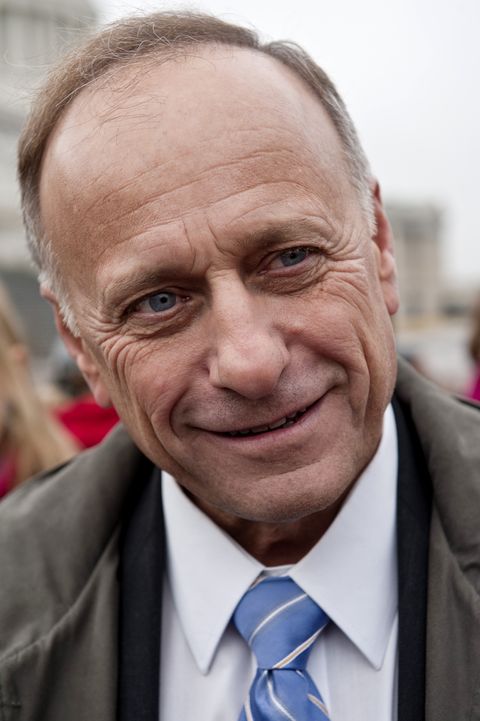
Getty Images
Steve King (R-Iowa)
For example, in 2010 Nunes traveled to northwest Iowa to campaign for Steve King, the most anti-immigrant member of Congress, who now represents Nunes’s parents, brother, and sister-in-law in Sibley. It was an unusual place to find Devin Nunes, given that at the time he wasn’t known to be hostile to immigrants in the way that has made King, who has called illegal immigration a “slow-motion terrorist attack,” so infamous.
King’s office posted a press release online announcing that the town-hall event would be in Le Mars, a town fifty miles southwest of Sibley, and included some biographical information about Nunes, including this fact: “Congressman Nunes’ family has operated a dairy farm in Tulare County, California for three generations.” There was no mention that the Nunes family actually lived up the road in Sibley, where they operated a dairy. Strange.
In June 2009, an obscure dairy trade publication, Dairy Star, ran a profile of the Nunes family dairy in Sibley. The article documents how the Nunes family, “recent transplants to the Midwest,” emigrated from Portugal to California to Iowa and started NuStar Farms, which Anthony Jr. manages with his son and wife.
The article mentions numerous Nunes family members, including Uncle Gerald, who was still back in California, and baby Maci, “the first Nunes to be born outside of California or Portugal,” but there is one person missing from the article: Devin Nunes.
Why would the Nuneses, Steve King, and an obscure dairy publication all conspire to hide the fact that the congressman’s family sold its farm and moved to Iowa? I went to Sibley to find out. Things got a little strange.
The first thing I did when I landed in Iowa, on August 27, was call Jerry Nelson, the author of the Dairy Star article. I’d read through Nelson’s other online articles. He’s funny and smart and could easily be a columnist at a major newspaper. When he was thirty, he almost died in a bizarre manure-pit accident, and he told me that since then he’s lived every day like it’s a blessing.
He was upfront and clear about why Representative Nunes wasn’t included in the Dairy Star profile of the Nunes family and the move to Iowa: The family asked him not to mention Devin. “They said, ‘Our brother’s involved in politics and we’re not going to talk about it and that’s that,’ ” Nelson told me. “And I said, ‘Okay, we’re here to talk about dairy farms.’ ”
Sibley, Iowa, is in the far north of the state, twenty minutes from the Minnesota border. It has twenty-six hundred people and feels smaller. The biggest attractions in town are a well-groomed golf course and a high-end coffee shop, the Lantern, which was named the best in Iowa by the Food Network. I stopped in at the Lantern, a big exposed-brick space with fancy espresso equipment, to meet with Joshua Harms, a web developer and local troublemaker who became a First Amendment cause célèbre this year after the town threatened to sue him if he didn’t take down his website, shouldyoumovetosibleyia.com, which documented a foul smell emanating from one of Sibley’s major businesses, a pig-blood processing plant. The ACLU championed Harms’s case and sued Sibley. The town quickly folded, wrote Harms an apology, and agreed to train its staff and lawyers in First Amendment law. The case made international headlines and embarrassed Sibley.
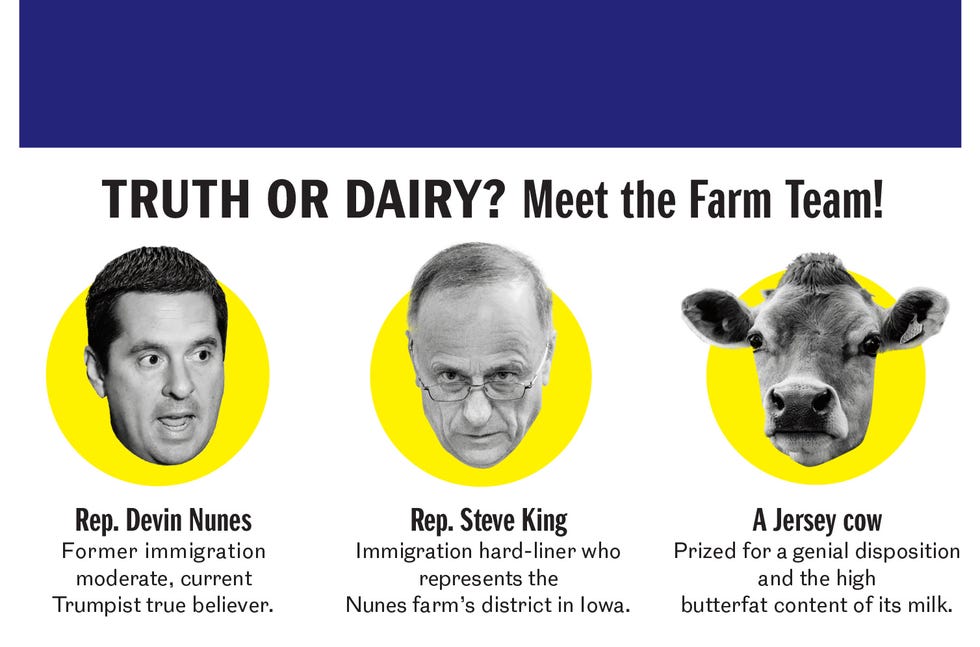
.
Harms is a Bernie Sanders supporter, which makes him an outlier in the town. Sibley is the seat of Osceola County, which voted 79 percent to 17 percent for Trump over Clinton, making it one of the most pro-Trump bastions in America. Steve King won the county in 2016 with a similar margin. The locals “tend to be very conservative, and of course they all are Trump backers,” said Nelson. Art Cullen, a Pulitzer prize–winning journalist at the nearby Storm Lake Times, told me that much of the population is “Dutch Reformed and very religious.” So I was only a little surprised when the owner of the coffee shop, Brenda Hoyer, asked, “Are you a believer?” as she came over to take my order. I muttered something about growing up Catholic and ordered an iced tea.
Hoyer’s extended family, including grandkids, were milling around the shop. The place had a welcoming family vibe and more diversity than you might expect. I noticed several Hispanic women eating pastries and speaking Spanish at a nearby table. Sibley is actually 8 percent Hispanic, and that growing population largely provides the labor for the area’s meatpacking, poultry, and dairy industries. Immigrants are essential to Iowa, which has an estimated forty thousand undocumented residents, mostly Hispanics, according to a 2014 report from the Pew Research Center. I was visiting the state just days after police found the body of Mollie Tibbetts, who was allegedly killed by an undocumented worker from a dairy farm, and everyone was talking about immigration. In a speech, Trump had used Tibbetts’s murder as a cudgel to bash “Democrat immigration policies” that he said were “spilling very innocent blood.”
Hoyer and I talked about Trump. She admitted she wasn’t crazy about the tweets and his messy personal life. She liked Mike Pence and noted “it would be a good deal” if Trump were impeached and replaced by Pence. When I told her I was working on a story about dairy farms, her ears perked up. She and her husband, Gene, were dairy farmers and had recently sold their business. “You should talk to Gene,” she said. When I mentioned Trump’s immigration policy, she was quick to add, “Well, we don’t agree with him on that!”
Then she told me something that knocked the wind out of me: “My son recently took his life.” It came out of nowhere, and I barely knew how to respond. His name was Bailey. He was seventeen and he had died thirteen days ago. This was the first day the coffee shop had been open since his death. I noticed a Bible verse in chalk behind the counter: “Do not fear for I have redeemed you. I have summoned you by name. You are mine.” The Lantern, I later learned, was actually a ministry that, according to its website, provides “a safe place where everyone is welcome.” I liked it there and decided to make it my office while I was in Sibley.
Jerry Johnson, Sibley’s mayor, walked in. He was wearing golf attire, and whatever ill will existed between him and Harms over what Harms called “the blood plant” seemed to have faded. Perhaps because of the town’s troubles with First Amendment law, Johnson was especially gracious to me. I explained why I was in Sibley, and he immediately suggested that I stop by Anthony Nunes Jr.’s house to interview him. When the subject turned to Trump’s zero-
tolerance policy on immigration, the mayor replied with what was already becoming a familiar refrain: “I don’t agree with him on that!”
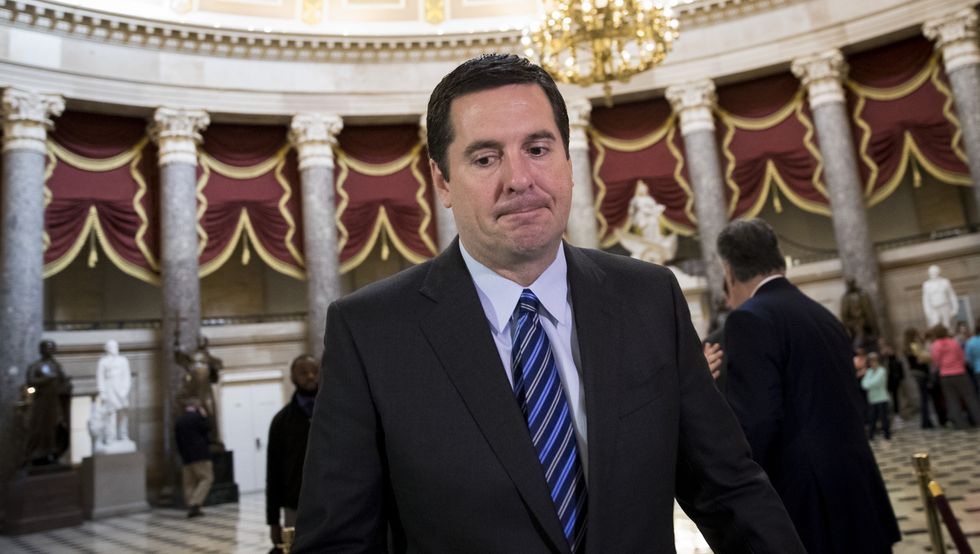
Getty Images
The Nunes family dairy, NuStar Farms LLC, sits on forty-three acres surrounded by corn on the southern outskirts of Sibley, off Highway 60, a main route between Sioux City and Minneapolis. According to Dairy Star, they have about two thousand Jersey cows. A source told me that NuStar sells almost all of its milk to Wells, an ice cream company in Le Mars, which makes the Blue Bunny brand. The NuStar cows are housed in two seven-hundred-foot, white aluminum barns that are the most prominent feature of the farm. The western sides of the barns are outfitted with dozens of steel ventilation fans that look like rocket engines from a distance, almost as if a pair of space-shuttle boosters had dropped in the middle of a cornfield. I visited during silage season, when dairymen are out cutting corn to make winter feed for their cows. It had just rained, and the smell of fresh silage, like an intense version of freshly cut grass, filled my car as it rumbled down a dirt road to NuStar. As I approached the dairy, a white Yukon SUV exited from NuStar’s muddy parking lot and passed me. I saw Anthony Nunes Jr. in the cab of a tanker truck. Instead of bothering him at work, I decided to take the mayor’s advice and visit him at home the next day.
It didn’t go well.
I found the Nunes home on the far north edge of town, where the leafy neighborhood bumps up against the surrounding farmland. In the driveway was another white Yukon—the fancier Denali version. Anthony Jr. was pulling out of the driveway in a farm truck. I waved at him, and he abruptly stopped the truck in the street and walked over to my car. He was wearing jeans and a work shirt. I told him my name and asked him if I could talk to him for an article about his dairy. “I’m taking your license plate down and reporting you to the sheriff,” he said. “I don’t want to be bothered.” I asked him again if I could interview him and he repeated himself, but this time a lot louder. “I don’t want to be bothered anymore.” As he walked to his truck, he looked back and warned me: “If I see you again, I’m gonna get upset.” Apparently Sibley’s First Amendment training hadn’t filtered down to all its residents.
Other dairy farmers in the area helped me understand why the Nunes family might be so secretive about the farm: Midwestern dairies tend to run on undocumented labor. The northwest-Iowa dairy community is small. Most of the farmers know one another, and most belong to a regional trade group called the Western Iowa Dairy Alliance (though WIDA told me NuStar is not a member). One dairy farmer said that the threat of raids from ICE is so acute that WIDA members have discussed forming a NATO-like pact that would treat a raid on one dairy as a raid on all of them. The other pact members would provide labor to the raided dairy until it got back on its feet.
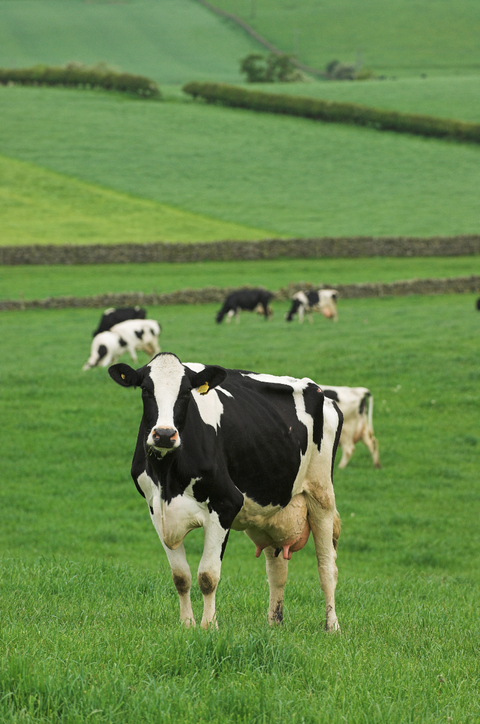
Getty Images
In every conversation I had with dairy farmers and industry insiders in northwest Iowa, it was taken as a fact that the local dairies are wholly dependent on undocumented labor. The low unemployment rate (it’s 2 percent in Osceola County), the low profit margins in the dairy business, and the global glut of milk that keeps prices low make hiring outside of the readily available pool of immigrants from Mexico and Guatemala unthinkable.
“Eighty percent of the Latino population out here in northwest Iowa is undocumented,” estimated one dairy farmer in the area who knows the Nunes family and often sees them while buying hay in nearby Rock Valley. “It would be great if we had enough unemployed Americans in northwest Iowa to milk the cows. But there’s just not. We have a very tight labor pool around here.” This person said the system was broken, leaving dairy farmers no choice. “I would love it if all my guys could be legal.”
The farmer explained that all the dairies require their workers to provide evidence of their legal status and pay the required state and federal taxes. But it’s an open secret that the system is built on easily obtained fraudulent documents. “I just look at the document—Hey, this looks like a good driver’s license, permanent resident card, whatever the case is—and that’s what you go with,” the farmer said. A second northwest-Iowa dairy farmer who knows the Nunes family told me, “They show you a Social Security card, we take out Social Security taxes. Where’d they get the card? I have no idea.” I asked what the chances are that a farm the size of NuStar uses only fully legal dairy workers. “It’s next to impossible,” the first dairy farmer said. “There’s no dang way.” This was speculation, but here is the logic that informed it: Most workers start at fourteen or fifteen dollars an hour, the first farmer said. If dairies had to use legal labor, they would likely have to raise that to eighteen or twenty dollars, and many dairies wouldn’t survive. “People are going to go broke,” the farmer said. The story was similar in the poultry, meatpacking, and other agricultural industries in the area.
What this person was describing was hard to wrap my head around. In the heart of Steve King’s district, a place that is more pro-Trump than almost any other patch of America, the economy is powered by workers that King and Trump have threatened to arrest and deport. I checked Anthony Nunes Jr.’s campaign-donor history. The only federal candidate he has ever donated to, besides his son, is Steve King ($250 in 2012). He also gives to the local Republican party of Osceola County, which, records show, transfers money into King’s congressional campaigns.
“I’ve talked to Steve King face-to-face, and that guy doesn’t care one iota about us. He does not care."
The absurdity of this situation—funding and voting for politicians whose core promise is to implement immigration policies that would destroy their livelihoods—has led some of the Republican-supporting dairymen to rethink their political priorities. “Everyone’s got this feeling that in agriculture, we, the employers, are going to be criminalized,” the first area dairy farmer I had spoken to said. “I’ve talked to Steve King face-to-face, and that guy doesn’t care one iota about us. He does not care. He believes that if you have one undocumented worker on your place, you should probably go to prison and we need to get as many undocumented people out of here as possible.” (A spokesman for King did not respond to multiple interview requests.) The second dairy farmer, speaking of Trump’s and King’s views on undocumented immigrants, added, “They want to send ’em all back to Mexico and have them start over. What a crock of malarkey. Who’s gonna milk the cows?”
After my encounter with Anthony Jr., I met Jerry Nelson, the Dairy Star reporter, down at the Lantern. He wasn’t surprised by the hostility. Think about the story from the family’s perspective, he told me: “They are immigrants and Devin is a very strong supporter of Mr. Trump, and Mr. Trump wants to shut down all of the immigration, and here is his family benefiting from immigrant labor,” documented or not.
Brenda Hoyer came by and said hello. I told her that I hoped it was okay to use her coffee shop for interviews. “Sure,” she said, “if you’re kind and truthful and honest.”
I asked Nelson what would happen, hypothetically, if ICE raided every dairy farm in the area tomorrow. “It would be a disaster for the dairies,” he said. “They would suddenly have nobody to milk or feed the cows. I don’t know what they would do.” The bell on the Lantern’s front door rang, and Hoyer huddled in the corner with a chubby man with dark, curly hair. After a few minutes, she came back over.
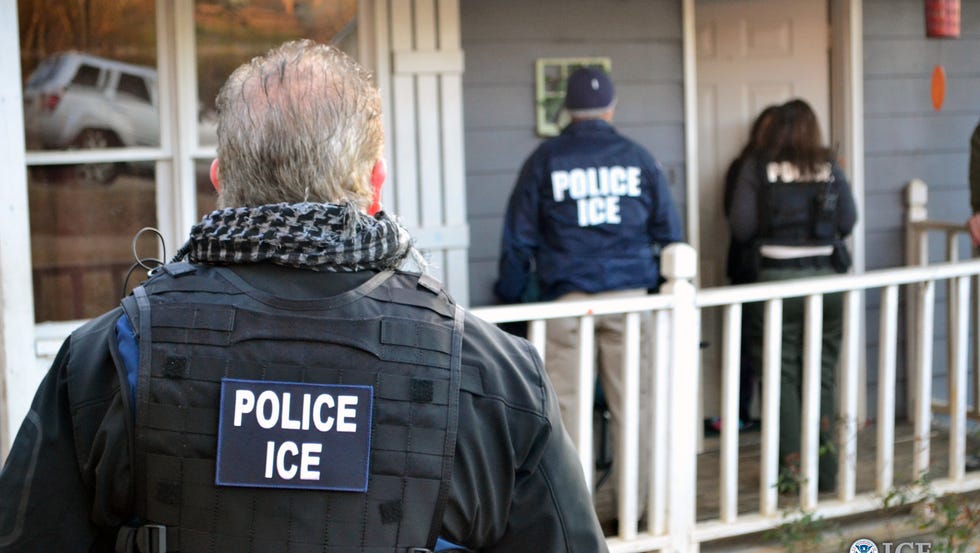
Getty Images
“You have a phone call,” she told Nelson.
“A phone call?” he asked. It made no sense. Anybody who knew where he was would call his cell. She asked him to come with her. A few minutes later, he returned in a panic and gathered his belongings. “We gotta go!” he told me.
On the way out I talked to Hoyer. Her demeanor had changed. I asked if I could still talk to Gene, her husband. She said it was no longer possible. I had to leave the coffee shop, she told me. “This article,” she said, “is going to destroy families.” As I walked out, I noticed the mysterious chubby man eyeing me.
Nelson was freaked out. There was no phone call, of course. The mysterious chubby man had asked Hoyer to have us ejected. According to Nelson, she had told him that an article about dairies and immigration would “destroy our lives out here.” It was an incredibly sensitive subject. “It’s kind of a third rail among dairy farmers,” Nelson said. “Whenever I go to a dairy farm, I never ask about the immigrant-labor thing unless they bring it up themselves.”
Later Nelson left me a voice mail in which he tried to explain the reaction. “Dairy farmers are very deeply patriotic and American, and yet here they are hiring these people who are not American,” he said. “And maybe they feel a little shame over that or feel like they are exploiting [people] and they don’t want that to come to light.”
Mayor Johnson was concerned about the run-in with Anthony Jr. He had suggested that I knock on the man’s door, and now he felt like the awkward encounter was his fault. He said he’d once had his own strange experience. A few years ago, the mayor reported one of Anthony Jr.’s workers, who was Hispanic, to the sheriff’s office because Johnson believed the worker’s yard was so messy it constituted a violation of the city property code. According to Johnson, Anthony Jr. called the sheriff on the worker’s behalf and insisted that the only reason anyone had complained was that they were prejudiced. (Several people I talked to in Sibley assumed Anthony Jr. himself is Mexican, not Portuguese, and he has no doubt experienced discrimination himself.)
The mayor, though, was impressively enlightened when it came to Sibley’s immigrant population. Perhaps because of the Nunes debacle, he invited me to his office to talk to him and the city administrator, Glenn Anderson. “I told him to go see Nunes, and that didn’t go very good,” he told Anderson as we sat down.
Anderson voted for Trump, but he exploded every Trump myth about immigration. The rise in Sibley’s Hispanic population hasn’t been accompanied by a rise in crime. Most of the crime in Sibley is connected to drug-related traffic stops on Highway 60, he said. Kevin Wollmuth, a deputy in the county sheriff’s office, told me that the rise in immigration “doesn’t have any bearing on our crime rate at all.” Worried that the community is underrepresented in city government, Anderson has tried to get the Hispanic population to run for city council, though without much success yet. He had no interest in knowing what anyone’s immigration status was. “If I see something, I’m not going to report it to ICE,” he said. “It’s not my job.” He added, “That’s not to say that everybody in town that lives here is legal. We don’t go knocking door-to-door to say, ‘Are you, are you not?’ ” He had much the same view of the local immigrant population as Rob Tibbetts, Mollie’s father, who two days before had said at a memorial service for his daughter, “The Hispanic community are Iowans. They have the same values as Iowans. As far as I’m concerned, they’re Iowans with better food.”
Sibley is emblematic of a lot of small towns in Iowa that are dependent on an agricultural economy: They know they cannot survive without immigrants, and they have worked hard to integrate the foreign-born population, despite the legal limbo faced by employers and employees alike. When I asked what would happen if ICE turned its attention to Sibley, the mayor shuddered. Anderson noted that he has never seen an ICE agent in the four years he’s been at his job. He didn’t seem eager to get to know any. “If they come in town, then we have to talk about it, find out what’s going on, why, whether to participate, and make sure our town’s not disrupted,” he said. I asked him what he thought of King’s view that all undocumented immigrants should be deported. He paused and said, diplomatically, “He has a right to his opinion.”
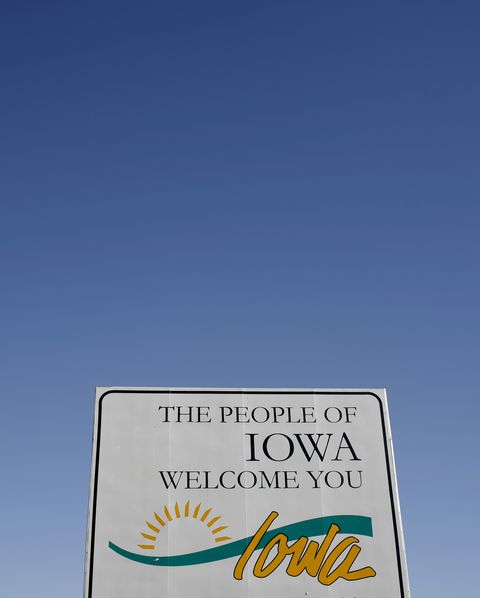
Getty Images
When I walked in the front door of the mayor’s office, I had noticed a mud-spattered white Yukon parked outside. As I was driving to my next interview, I looked in the rearview mirror and noticed the white Yukon again. I drove aimlessly, crisscrossing streets from one end of town to the other. Everywhere I turned, the white Yukon appeared. I was being followed. When I turned the tables and followed the car back, it raced off. We played cat and mouse like that for more than an hour until I finally got a good glimpse of the driver: It was a middle-aged woman with curly, red hair who had a cell phone stuck to her left ear. The cat-and-mouse game started to feel a little dangerous, so I left town for a couple hours. On my way back into Sibley, the same car passed me on the highway. This time, the chubby man from the Lantern was driving. He smiled and waved.
Or maybe I’d made a mistake. White SUVs are common. Could I really be sure that was the same guy and the same Yukon? A woman was driving the car earlier; now it was a man. It didn’t make sense. Maybe I was just being paranoid.
I had a particularly sensitive interview that afternoon with a source who I knew would be taking a risk by talking to me about immigration and labor at NuStar. When I arrived, we talked for a few minutes before the source’s cell phone suddenly rang. The conversation seemed strained. “_Sí, aquí está,_” the source said. I learned that on the other end of the phone was a man named Flavio, who worked at NuStar. Somehow Flavio knew exactly where I was and whom I was talking to. He warned my source to end the conversation. Not only was I being followed, but I was also being watched, and my sources were being contacted by NuStar.
I left and drove to the local grocery store, where I parked in the open, hoping to draw out whoever was tailing me. I suddenly noticed a man in jeans, a work shirt, and a baseball cap pulled down low. He was talking on his cell phone and walking suspiciously. Was he watching me? I held up a camera to take pictures and he darted away. I followed. His car was parked haphazardly on the side of the road half a block away. He got in and took off while I followed. It was a dark Chevrolet Colorado pickup truck—with California license plates. I ran the license-plate number through a database. The car was registered in Tulare, California.
On December 13, 2011, ICE agents raided the home, business, and farms belonging to Mike Millenkamp, a dairy farmer in eastern Iowa. It was the beginning of a seven-year ordeal that would upend Millenkamp’s life. At the time of the raid, he had just four employees. Three of them were undocumented. ICE hauled away his business records, arrested his employees, and launched an aggressive investigation. After sifting through his files, the government said that about three quarters of the thirty-eight workers he had employed over a four-year period were undocumented. Millenkamp pleaded guilty to “illegal alien harboring” and agreed to pay $250,000 in fines and penalties. Despite a relatively clean record, he was sentenced to three months in federal prison and three years of supervised probation, which just ended this past summer.
Prosecutors used Millenkamp to send a warning to other Iowa dairy farmers. As part of his plea deal, they forced him to submit an op-ed to major Iowa newspapers describing his experience. His article, which was preapproved by the local U. S. attorney’s office, appeared in The Des Moines Register on June 29, 2016. “If you employ someone you know is not legal, you are committing a federal crime,” he wrote.
The Millenkamp prosecution seemed unjust—capricious. And it helped explain the reaction I received in Sibley. “That’s why they are so concerned,” Nelson told me when I mentioned that I was being followed and that my sources were being harassed. “They think you are going to mess with their lifestyle or take it away, interfere with it.”
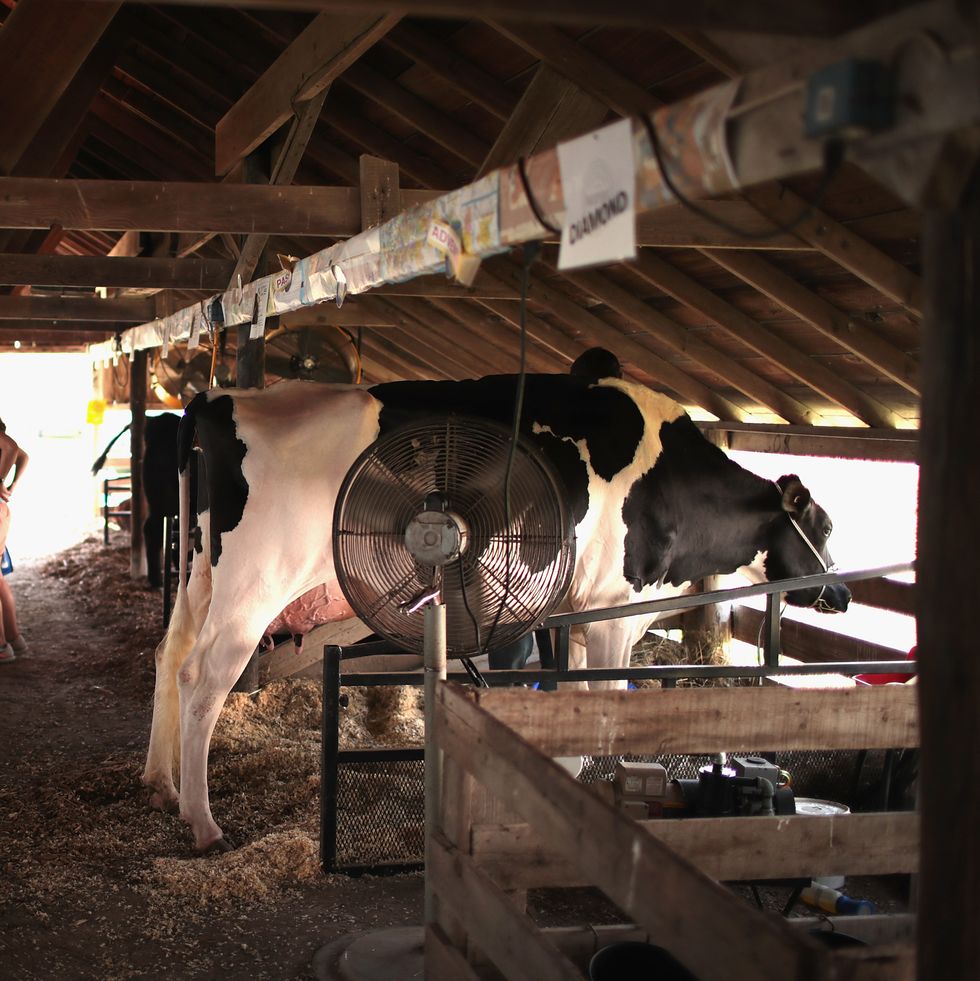
Getty Images
He and I discussed the ethics of reporting on immigration and politics. What if an article triggered an ICE raid? Was there even a story here, anyway? Devin Nunes was the public figure at the heart of this, and he had no financial interest in his parents’ Iowa dairy operation. On the other hand, he and his parents seemed to have concealed basic facts about the family’s move to Iowa. It was suspicious. And his mom, who co-owns the Sibley dairy, is also the treasurer of his campaign. In 2007, Devin and his wife, Elizabeth, used the NuStar dairy’s Iowa post-office-box address on a filing with the SEC regarding a financial holding company the family co-owns, even though Devin and Elizabeth live in California.
And even without the connection to Devin, who is one of Trump’s most important allies, there was a bigger story. The American dairy industry is at the center of an international trade war. Trump frequently attacks Canada for protecting its dairy farmers. “We love Canada,” Trump said on September 18. “They cannot continue to charge us 300 percent for dairy products.” At a hearing on the issue in March, Nunes attacked Canada for “getting away with murder in their dairy industry.” Canadian officials have responded by noting that the American dairy industry is artificially protected by both federal subsidies—NuStar, according to figures based on USDA numbers, has received $140,938 since it started—and its reliance on low-wage, undocumented labor. “The industry itself in the United States has admitted they wouldn’t be viable if they couldn’t use undocumented workers,” a former Canadian trade minister, Ed Fast, recently complained to the country’s Financial Post. The same could be said for much of the broader American agricultural industry—from poultry to meatpacking to grape-picking to cotton—which represents 6 percent of the U. S. economy.
There is massive political hypocrisy at the center of this: Trump’s and King’s rural-farm supporters embrace anti-immigrant politicians while employing undocumented immigrants. The greatest threat to Iowa dairy farmers, of course, is not the press. It’s Donald Trump.
But that’s not how the Nunes family apparently saw it. On my third day in Sibley, I became used to the cars tailing me. In the morning, I was followed by the redhead in the muddy white Yukon. In the afternoon, there was a shift change and I was followed by a different, later-model white Yukon. I stuck a GoPro on my dashboard and left it running whenever I parked my car. When I reviewed the videos, one of the two Yukons could always be seen slowly circling as I ate lunch or interviewed someone.
There was no doubt about why I was being followed. According to two sources with firsthand knowledge, NuStar did indeed rely, at least in part, on undocumented labor. One source, who was deeply connected in the local Hispanic community, had personally sent undocumented workers to Anthony Nunes Jr.’s farm for jobs. “I’ve been there and bring illegal people,” the source said, asserting that the farm was aware of their status. “People come here and ask for work, so I send them over there.” When I asked how many people working at dairies in the area are documented citizens, the source laughed. “To be honest? None. One percent, maybe.”
The source added, “Who is going to go work in the dairy? Who? Tell me who? If people have papers, they are going to go to a good company where you can get benefits, you can get Social Security, you can get all the stuff. Who is going to go [work in the dairy] to make fourteen dollars an hour doing that thing without vacation time, without 401(k), without everything?”
“In the heart of Steve King’s district, a place that is more pro-Trump than almost any other patch of America, the economy is powered by workers that King and Trump have threatened to arrest and deport.”
A second source, who claimed to be an undocumented immigrant, also claimed to have worked at NuStar for several years, only recently leaving the dairy, which this source estimated employed about fifteen people. (As a rule of thumb, dairies need one employee for every eighty to one hundred cows, so fifteen workers would be a lean operation given the dairy’s two-thousand-head herd.) The former NuStar employee, who is middle-aged, claimed to have arrived in the United States from Guatemala in 2011. This source was nervous to talk to me and did not want to speculate about the immigration status of fellow employees. “I worked for Anthony for four years,” the source said, speaking in Spanish through a translator. “First milking cows and after that feeding the baby calves.” It was “very hard work,” but the employee and others were “treated well.”
A third source, who claimed to work at a nearby dairy, not NuStar, explained what the local dairy jobs are like. This source claimed to be eighteen years old and to have come from Guatemala two years ago, after paying smugglers 10,000,raisedbyextendedfamily,toprovidetransitthroughMexicoandacrosstheU.S.border.Thesourcesaidthepayatthedairywasfourteendollarsanhourformilkingcowstwelvehoursaday,sixdaysaweek,which,aftertaxes—thesourcehadprovidedthedairywithafakeSocialSecuritynumber—workedouttoabout10,000, raised by extended family, to provide transit through Mexico and across the U. S. border. The source said the pay at the dairy was fourteen dollars an hour for milking cows twelve hours a day, six days a week, which, after taxes—the source had provided the dairy with a fake Social Security number—worked out to about 10,000,raisedbyextendedfamily,toprovidetransitthroughMexicoandacrosstheU.S.border.Thesourcesaidthepayatthedairywasfourteendollarsanhourformilkingcowstwelvehoursaday,sixdaysaweek,which,aftertaxes—thesourcehadprovidedthedairywithafakeSocialSecuritynumber—workedouttoabout1,600 every two weeks. When I asked how many dairy workers in the area are undocumented, the source replied, “_Todos_”—everybody.
When I left the interview with the third source, I got in my car and reviewed the GoPro footage. The car had been circled by the newer white Yukon the entire time I was gone. I decided I needed to get out of Sibley for a while and get some advice about how to tell this story ethically. So I drove to Worthington, Minnesota, to meet a priest.
Worthington is just over the border, less than thirty minutes away. I found Father Jim Callahan at his kitchen table, wearing a Hawaiian shirt and chain-smoking Winstons. Worthington, which is five times the size of Sibley, is a hub for Hispanic immigrants in the Midwest. The influence is unmistakable as you drive down the main street, which is dominated by stores and restaurants that cater to the Hispanic population. More than 70 percent of the students in the local elementary school speak Spanish as their first language. Callahan, whose church, St. Mary’s, conducts Mass in both English and Spanish, estimates that 90 percent of the Hispanic population in the city is undocumented.
Trump’s election was a seismic event here. “Absolute fear” is how Callahan described the postelection atmosphere. “Some people were saying they’re going back. Then we saw spikes in domestic abuse, alcoholism, drug addiction.” In December 2016, he declared St. Mary’s a sanctuary church, which means it shelters undocumented immigrants and protects them from arrest and deportation. “ICE has been active,” he said. “They’re in town two or three times a week.” He added, “But they haven’t targeted farms as such yet.”
I laid out the facts I had uncovered in Sibley, including the intimidation of sources and the Devin Nunes angle, and asked him for advice. “I’d tell that story,” he said. He paused and added, “We’re a sanctuary church, if you need a place to stay. You’re safe here!”
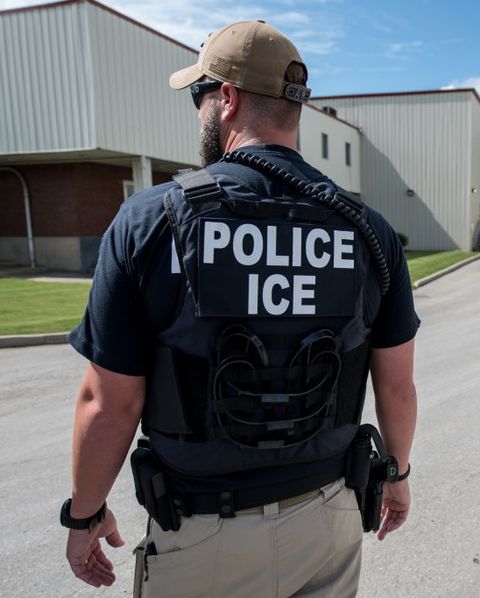
Getty Images
On the way back to Sibley, I stopped at Hawkeye Point, the highest elevation (1,670 feet) in Iowa, and flipped through my GoPro videos and pictures, zooming in on the drivers and cars. I clicked over to Facebook and searched for any Nuneses in Sibley, Iowa. I saw some familiar faces. It all started to click. There was the redheaded woman from the muddy white Yukon; she was Devin’s sister-in-law, Lori Nunes. There was the chubby guy with curly hair from the Lantern who had also waved at me from the same Yukon; he was Devin’s brother and Lori’s husband, Anthony Nunes III. There was the woman from the newer Yukon. I zoomed in on a picture of the car’s license plate: nustar. Not very subtle. The driver was Devin’s mother and campaign treasurer, Toni Dian Nunes. The guy in the pickup truck with California plates was, of course, Devin’s dad, Anthony Jr.
I learned that Anthony Jr. was seemingly starting to panic. The next day, the 2009 Dairy Star article about NuStar, the one that made me think the Nuneses were hiding something and that had led me to Sibley in the first place, was removed from the _Dairy Star_’s website. Anthony Jr., I was told, had called the newspaper and demanded that the editors take the nine-year-old story down. They relented. The article wasn’t captured by the Internet Archive, which provides cached versions of billions of web pages, and it can no longer be found anywhere online. According to someone who talked to him that day, Anthony Jr. allegedly said that he was hiring a lawyer and that he was convinced that his dairy would soon be raided by ICE. (Is it possible the Nuneses have nothing to be seriously concerned about? Of course, but I never got the chance to ask because Anthony Jr. and Representative Nunes did not respond to numerous requests for interviews.)
“I drove aimlessly, crisscrossing streets from one end of town to the other. Everywhere I turned, the white Yukon appeared. I was being followed.”
I hope ICE stays the hell away from Sibley. The immigration system that powers Iowa’s dairies is undoubtedly broken. The dairy owners live with the ever-present fear of becoming the next Mike Millenkamp. The undocumented workers live in the shadows and, especially in the era of Trump and zero tolerance, constantly fear arrest and deportation. Meanwhile, Republicans in Congress, including Devin Nunes (per his CaRepublican website), have decided that unwavering support for ICE is crucial to their efforts to attack Democrats and help the GOP keep control of the House of Representatives after the midterm elections. Naturally, the prospect of passing legislation that would create a guest-worker program for dairy workers who are undocumented—an idea overwhelmingly supported by the industry—is a fantasy in the current environment; Trump, King, and their allies describe such policies as “amnesty.” The Washington debate is completely detached from what is actually going on in places like Sibley.
The relationship between the Iowa dairy farmers and their undocumented employees is indeed fraught. I cringed at the way some of the dairy farmers talked about their “help.” When I asked one dairy farmer, who admitted many of the farm’s workers are undocumented but who also inexplicably claimed to be “very supportive of Trump” and “kind of in favor of his immigration laws,” what a solution would be, this farmer suggested a guest-worker program but compared the workers to farm animals. “It’s kind of like when you bought cattle out of South Dakota, or anyplace, you always had to have the brand inspected and you had to have the brand sheet when you hauled them across the state line,” the farmer said. “Well, what’s the difference? Why don’t they have to report to the city hall or county office and say we’re here working and everybody knows where they’re at?”
As bad as this paternalistic and exploitative system can be, Nelson and the dairy farmers insisted that most dairies are family-owned and -operated and that the workers, documented or not, often become part of the family. This somewhat clichéd view can be overblown and sometimes used to defend an unfair system, but the sentiment helped me understand Brenda Hoyer’s chilling warning to me at the Lantern. During her son’s wake, four Hispanic employees from their former dairy came to express their condolences. They had worked there so long that their children refer to her husband, Gene, as Grandpa.
According to someone he told the story to, Gene received them and thanked them. “I’ve lost a son,” he said to the four men, “but I still have four others.”
This article appears in the November '18 issue of Esquire. Subscribe
